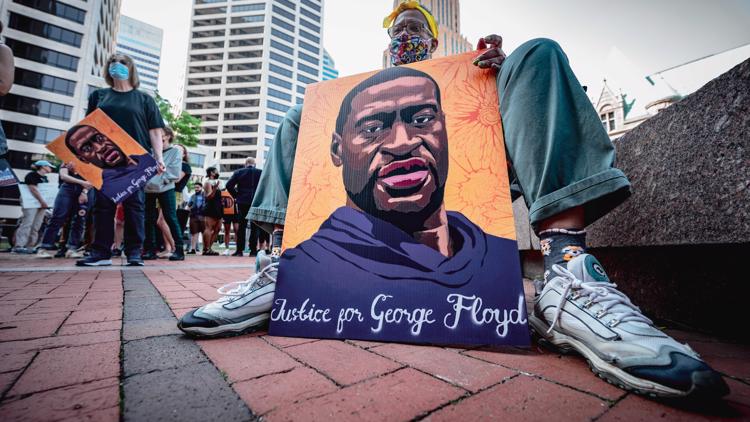WASHINGTON — UPDATE: On Friday, June 25, 2021, former Minneapolis police officer Derek Chauvin was sentenced to 270 months, or 22.5 years, in prison for the murder of George Floyd by Judge Peter Cahill, with a credit for 199 days of time served.
Cahill said he has included a 22-page memo with Chauvin's sentence that contains his legal analysis.
Following sentencing, Cahill says Chauvin cannot possess a firearm for the rest of his life and he must register as a "predatory offender."
Prior to the sentencing, Cahill denied Chauvin's motion for a new trial.
PREVIOUS REPORT: It's been one year since George Floyd was killed by former Minneapolis police officer Derek Chauvin on May 25, 2020. Floyd's death sparked nationwide mass demonstrations calling for police reform and racial justice.
Chauvin, the officer who was seen on video kneeling on Floyd's neck, was convicted in April 2021 of second-degree unintentional murder, third-degree murder and second-degree manslaughter for killing Floyd. The other three officers charged in connection with Floyd's death are scheduled to face trial in March 2022 on charges of aiding and abetting second-degree murder and manslaughter.
The VERIFY team researched questions regarding police killings and proposed police reform legislation following Floyd's death as part of our “VERIFY Weekly” feature. You can watch the full video on our YouTube page here.
THE QUESTION
Has there been a decline in police killings since Floyd’s death?
THE SOURCE
THE ANSWER
Yes, recent data indicates that there was a slight decline in the number of police killings since last Memorial Day compared to the previous year.
WHAT WE FOUND
The FBI collects use-of-force data but participation by law enforcement agencies is voluntary. In 2020, more law enforcement agencies did not participate than those that did.
VERIFY used data from Mapping Police Violence to compare police killings year over year. Mapping Police Violence defines a police killing as, "A case where a person dies as a result of being shot, beaten, restrained, intentionally hit by a police vehicle, pepper-sprayed, tasered, or otherwise harmed by police officers, whether on-duty or off-duty."
At the time this story was produced, data was available through May 9, 2021. So, the VERIFY team compared the number of killings from the day after Floyd’s death -- May 26, 2020 -- until May 9, 2021, with the same time frame a year earlier-- May 26, 2019, through May 9, 2020.
According to the data, in the year preceding Floyd’s death, police killed 1,103 people. In the year following Floyd’s death, that number dropped 6.6% to 1,030.
THE QUESTION
Is there a national database to check if a state has passed any police reform bills?
THE SOURCE
THE ANSWER
Yes, there is a national database where people can check the status of a variety of police reform bills and current guidelines. It's called the National Conference of State Legislatures. People can check everything from executive orders to new policing methods that have been introduced.
The database includes law enforcement legislation from all 50 states and also Washington D.C. It is free to use. There are several ways to search for legislation or topics, including by keyword, year and state.
Beyond current legislation status, the database also allows people to check where their state stands on officer training requirements, such as use of force or warrants. Data is also available on currently policing alternative measures.
THE QUESTION
Have lawmakers expressed bipartisan support for federal police reform?
THE SOURCES
THE ANSWER
Yes, there is bipartisan support for some police reform measures. Republicans and Democrats have advocated for police reform since George Floyd's death, but they differ on specifics.
Republican leaders like Senate Minority Leader Mitch McConnell, and Sen. Tim Scott from South Carolina, introduced the JUSTICE Act in June, but it died in the Senate after a filibuster from the Democrats.
The proposal sought to reform police departments by diversifying hiring practices, increasing body cameras and requiring departments to submit reports to the FBI after an officer uses force or a firearm.
Democratic leaders Speaker of the House Nancy Pelosi and Senate Majority Leader Chuck Schumer introduced their own bill in June, dubbed the Justice in Policing Act of 2020. The bill passed the House and is currently being debated in the Senate.
The Justice in Policing Act is similar to the JUSTICE Act, but would also make it easier to prosecute police officers who kill or injure someone, ban chokeholds and no-knock warrants, and require racial bias training for officers. The two parties have been negotiating the details of the Democrats' proposal, and President Biden is pushing Congress to pass it.
So, while the two parties differ on the scope and specifics, there has been bipartisan support for some type of federal police reform legislation.
VERIFY
Our journalists work to separate fact from fiction so that you can understand what is true and false online. Please consider subscribing to our daily newsletter, text alerts and our YouTube channel. You can also follow us on Snapchat, Twitter, Instagram or Facebook.













